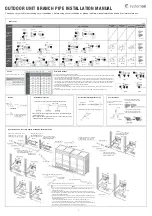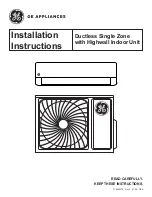
Do not install the air conditioner at any place
where there is a danger of flammable gas
leakage.
In the event of a gas leakage, build-up of gas
near the air conditioner may result in a fire.
Carry out drain piping properly to ensure
complete drainage.
If drain piping is not carried out properly, drain
will not flow out. Then, dirt and debris may be
accumulated in the drain piping and may cause
water leakage. If it occurs, stop the air conditioner
and call your local dealer for assistance.
Do not remove the outdoor unit’s outlet side
grille.
The grille protects against the unit’s high speed
fan, which may cause injury.
To avoid injury, do not touch the air inlet or
aluminum fins of the air conditioner.
Do not place objects that are susceptible
to moisture directly beneath the indoor or
outdoor units.
Under certain conditions, condensation on the
unit or refrigerant piping, air filter dirt or drain
blockage may cause dripping, resulting in fouling
or failure of the object concerned.
Do not place heaters directly below the
indoor unit, as resulting heat can cause
deformation.
Do not place appliances that produce naked
flames in places exposed to the airflow
from the air conditioner as this may impair
combustion of the burner.
Do not block air inlets nor outlets.
Impaired airflow may result in insufficient
performance or trouble.
Do not use the air conditioner for purposes
other than those for which it is intended.
Do not use the air conditioner for cooling
precision instruments, food, plants, animals or
works of art as this may adversely affect the
performance, quality and/or longevity of the
object concerned.
After prolonged use, check the unit stand and
its mounts for damage.
If left in a damaged condition, the unit may fall
and cause injury.
Arrange the drain hose to ensure smooth
drainage.
Imperfect drainage may cause wetting of the
building, furniture etc.
Do not sit or place objects on the outdoor unit.
Falling yourself or falling objects could cause
injury.
Do not wipe the controller panel with benzene
or other organic solvent.
Never operate remote controller buttons with
hard, pointed objects.
This will cause discoloration and/or peeling.
If the panel needs cleaning, use a damp cloth
with some water-diluted neutral detergent.
Do not operate the air conditioner when using
a room fumigation type insecticide.
Take care of scaffolding and exercise caution
when working high above ground level.
Fumigation chemicals deposited in the unit could
Do not operate with the control panel lid open.
If water gets inside the panel, it may result in
equipment failure or electric shock.
endanger the health of those who are hypersensitive
to such chemicals.
Do not pull or twist the remote controller cord.
This may cause malfunctioning.
Wipe with a dry cloth afterwards.
Ensure that the remote controller is not exposed
to direct sunlight.
This will cause discoloration of the LCD display with
resulting loss of readability.
4
NOTE
•
Read the operation manual attached to the
remote controller you are using.
When using a wireless remote controller, refer to the
operation manual attached to the wireless remote
controller kit.
This operation manual is for the following systems
with standard control.
Before initiating operation, contact your local dealer
for the operation that corresponds to your system.
2. WHAT
TO DO
BEFORE
OPERATION
Indoor unit
Outdoor unit
Unit with
remote
controller
Unit without remote
controller
(When used as
si
m
ultaneous
operation system)






































